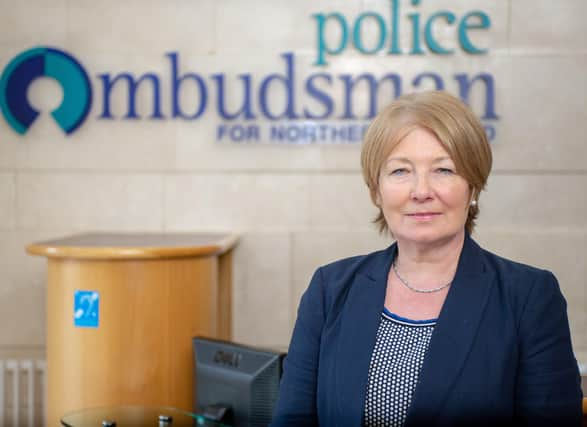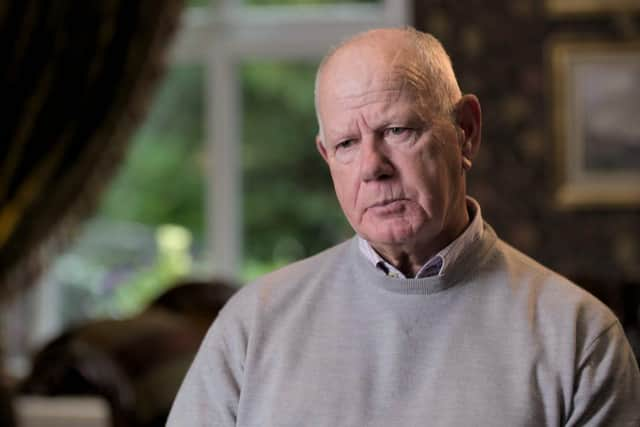Ray White: Former RUC officers still face toxic findings of collusion with loyalist terrorists, that cannot be challenged


The overwrought yet sadly predictable response in some local media and political circles to the new catch phrase generated by the Police Ombudsman namely ‘collusive behaviour’ has settled down.
It allows space for a more objective analysis of what has actually occurred, and for which detailed answers are required from the Office of the Police Ombudsman for Northern Ireland (OPONI).
Advertisement
Hide AdAdvertisement
Hide AdIn summary, retired police officers are subject to disgraceful delays in historic investigations.


Some years ago the courts ruled that we could not be found guilty of ‘collusion’ without due process. Yet this is still happening, but it is just called ‘collusive behaviour’.
The media headlines are the same: that ex RUC have been determined by the ombudsman to have engaged in collusion, which implies illegal complicity with murderous loyalist terrorists.
We were led to believe by the courts that this trashing of the reputation of former RUC officers, against whom there is no evidence of criminal wrongdoing, would not happen. But the latest OPONI report into the police investigation of the tragic murder by loyalist killers of Damien Walsh on March 25 1993 shows that nothing has changed.
Advertisement
Hide AdAdvertisement
Hide AdThe manner in which the exercise of the legal powers granted to the ombudsman (by virtue of the Police Act NI 1998) was applied by the former incumbent in that office in the conduct of an earlier investigation into the Loughinisland massacre was challenged in judicial review.


I was part of that legal case, so naturally I was interested to see how its outcome, and the detailed guidance given by the courts, would impact on both the quality and format of subsequent ombudsman reports (Section 62 Public Statements).
My first observation is a general one in that this latest investigation by OPONI commenced in February 2004 and only concluded in July 2021 which means that for 17 years all retired police personnel and their families have had to endure the stress generated by a criminal investigation and the related intrusions by investigating OPONI personnel into their private lives.
It illustrates yet again the chaotic structure of PONI investigations where the continuing disregard for Article 6 (of the European Convention on Human Rights) requirements that every investigation be conducted expeditiously, is disregarded to the detriment of the physical and mental well-being of all those caught up in the process.
Advertisement
Hide AdAdvertisement
Hide AdIn the 20 years existence of the office the issue of continuous delay and obfuscation as to the reasons for the same, has been an issue of deep concern for retired police officers, yet unlike other public bodies within the criminal justice system who have strict time limits to adhere too, it appears not to be the case with OPONI.
No amount of reference to this flagrant abuse by the ombudsman, has ever raised any concerns within the Department of Justice, the Criminal Justice Inspectorate or any other human rights focused organisation.
OPONI is without any accountability in this respect.
The outcome is that the Article 6 and related Article 8 (right to non interference in private life) rights of a large number of retired police personnel and their families have for years been abused at will and yet the ombudsman has the audacity to adversely comment on the reluctance of retired police to co operate with her office when they are treated with such contempt.
Instead of addressing the issues within her own department the ombudsman, Marie Anderson, chooses instead to seek additional powers of compulsion that will be applicable to all citizens whom she believes have information relative to a matter she is investigating.
Advertisement
Hide AdAdvertisement
Hide AdDespite the treatment meted out by OPONI, in respect of this investigation I note that 26 retired officers gave full co operation with the office. As the ombudsman has stated all were investigated under the provisions of PACE (Police and Criminal Evidence Act) in respect of the detailed terms of reference (see panel below).
The outcome of this investigation generated over 260 actions for ombudsman investigators (according to the ombudsman) of which the investigative team manages to address 15 actions per year.
The end result — the ombudsman found no cause even to prepare a criminal file on the matter, as no police officer was suspected let alone arrested on suspicion of having committed a criminal offence.
When, if at all, the retired officers who co operated with OPONI in this 17 year long investigation were informed that they were no longer under investigation for culpability in the murder of Damien Walsh is unclear from the ombudsman’s report, but if previous practice applied the need to provide such stress relieving information was most likely disregarded as a necessity.
Advertisement
Hide AdAdvertisement
Hide AdLike many before them they would have had to await the ombudsman’s media presentation to learn of the conclusion to the investigation.
The ombudsman having settled the matter of the criminal investigation then in her report turned her attention to the issue of “collusion” as she had to address the allegation made by Mrs Walsh of police collusion in Damien’s murder.
It is deeply concerning that the ombudsman’s statement does not indicate to what extent, if at all, or at what stage of her investigation she sought to invite Mrs Walsh to be more specific as regards what factors surrounding her son’s murder she thought amounted to “collusion”.
It was central to the ombudsman’s ability to answer what she declared was her next task, “my role is limited to acknowledging whether the matters ‘uncovered’ by an investigation are ‘very largely‘ what the families claimed constituted ‘collusive behaviour”.
Advertisement
Hide AdAdvertisement
Hide AdThis statement suggests it is a family’s perspective of what amounts to collusion and not that of the ombudsman or any other body that sets the parameters for an investigation into a collusion allegation.
If so, then there appears to be no end to what a complainant may allege collusion to be.
Have we arrived at a situation where OPONI will be required to dedicate more resource to probe beliefs, inferences, suspicions and conspiracy theories than allegations of criminal conduct?
The ombudsman, in her latest report, indulged in a detailed analysis of definitions of collusion in the public arena ending up with a list of what she deduced “collusion” to be (see the panel below).
Advertisement
Hide AdAdvertisement
Hide AdWhy she needed to do so is deeply concerning as Lord Justice McCloskey in his ruling on her predecessor’s report on the police Loughinisland investigation, was explicit on how the term was to be applied (see panel below).
Why did the ombudsman construct her own definition?
The OPONI has no legal licence to indulge itself, outwith any parliamentary approved process, with the capacity to formulate a new ‘offence’ or any derivative of the term collusion, or to distil from other definitions the alleged elements of the same.
We retired police officers fear this has been done to facilitate an extended investigation, using police powers, beyond the point whereby it has already been established by the office that no criminal offence has been committed.
The court has been clear that the term collusion must connote or denote the commission or participation in a substantive offence the essential elements of which are identified in law so that those accused of a ‘collusion’ type offence or related ‘collusive behaviour’ understand what is prohibited, open to investigation and sanction if proven.
Advertisement
Hide AdAdvertisement
Hide AdIt is extremely worrying that the ombudsman is apparently willing to engage in a grammatical hair splitting exercise, whereby what is prohibited by the courts, is circumvented by presenting it as being under a new banner of ‘collusive behaviour’.
This is a new term, distinct from the term ‘collusion’ itself. It only came into being post the judicial review establishing the ultra vires abuse of investigative powers granted to OPONI in respect of its determinations. If a new capacity exists to find ‘collusive behaviour’ it poses two questions for the ombudsman:
1. What is the distinction, that the ordinary person in the street can understand, between ‘collusion’ and “behaviour that is deemed to be collusive”, that prohibits a Section 62 public statement being made in respect of the former and not the latter?
2. How and when was information conveyed to the 26 retired officers and their legal representatives that the information provided by them was now to be retrospectively examined against a new ‘offence’ of collusive behaviour?
Advertisement
Hide AdAdvertisement
Hide AdWe retired officers fear that this new phrase is being used to keep alive the toxic phrase collusion.
The ombudsman can determine that the actions or omissions of officers constitute “collusive behaviour,” for which they are then open to public criticism.
In my view such action by the ombudsman flies in the face of what a judge has made clear: “Every ‘public statement’ promulgated by the Police Ombudsman under section 62 of the 1998 Act has legal effects and consequences. Furthermore, as the present challenge demonstrates, each can have a major human impact, and may also impinge on, the legal rights of individuals.”
One would have thought that by now this latest public statement by the ombudsman would be a matter of serious concern to the justice minister in particular and all political parties.
Advertisement
Hide AdAdvertisement
Hide AdWithout them devising a law approving the same, we have a public investigatory body now framing what is in effect, in the eyes of the media and the public, a new ‘offence’ of “collusive behaviour,” the evidential content or threshold of proof of which is unknown, but which has now been applied to a former criminal investigation conducted 28 years previous and in respect of which a determination has now been made, applying the declared elements of the new offence, that grounds exist for some 26 retired police officers to be publicly sanctioned.
The political response to this new finding of “collusive behaviour” is silence.
It appears that everyone is content to see a public body engage in what is in effect law making, without any necessity to adhere to the requirements of natural justice whereby the old principle of innocent until proven guilty is protected.
Is this silence because it is retired police officers who are affected?
Advertisement
Hide AdAdvertisement
Hide AdWhat compounded this ridiculous exercise in grammatical circumnavigation by OPONI was the ombudsman’s claims about her obligation to observe procedural fairness requirements, which she says she discharged under Maxwellisation principles (sending proposed criticisms of an individual to them for their comment), by providing to retired officers limited and disjointed extracts from her draft report for comment within an imposed 30 day time limit.
The farce of this exercise lies in the fact that the atrocious murder of Damien Walsh occurred in 1993, some 28 years previous, the investigation by OPONI took 17 years only to be complete in 2021, and retired officers were expected to respond within 30 days to a new offence of collusive behaviour that was being retrospectively applied to their alleged acts or omissions all those years ago.
The responses they were required to make by necessity had to be constructed entirely from memory as they were denied access to investigation records they made at the time.
Yet our justice minister, politicians, academia, or our many human rights advocates, seem to have been accepted this as a fair process as again no one has seen fit to publicly question the process.
Advertisement
Hide AdAdvertisement
Hide AdIs the office of the Police Ombudsman regarded as being so sacrosanct that resort to the courts is the only mechanism by which it can be held to account?
The ombudsman is required to secure the confidence not only of the public in the use of its investigative powers but the police themselves.
Establishing confidence is essential to maintaining respect for the impartiality and professionalism of the office and it in turn generates a spirit of co operation amongst retired personnel who still, despite the passage of time, have a strong sense of commitment to accountability and upholding the law.
However the latest public statement from the ombudsman does nothing to engender that respect.
Advertisement
Hide AdAdvertisement
Hide AdSomething urgently needs to be done because OPONI is now being viewed as an investigative body which has empowered itself to make findings on a new ‘offence’ which can damage individual reputations or that of a former public body, or worse raise public anxieties.
• Assistant Chief Constable Raymond White is a former head of RUC Special Branch
• Morning View: Ray White’s brilliant essay highlights the legacy scandal facing the RUC, which has an impeccable Troubles record
• Terms of reference of Police Ombudsman probe into the RUC Walsh investigation:
Advertisement
Hide AdAdvertisement
Hide AdI. Establish whether a member of the RUC or agent of the RUC may have been culpable in this murder including the supply of information, withholding evidence, assisting offenders or other obstruction, whether passive or direct interference, of related police investigations;
II. Establish if the RUC were in possession of intelligence which, if acted on, may have prevented the murder;
III. Establish if the police investigation of the murder or other linked incidents were adversely impacted by the non-dissemination of intelligence or otherwise obstructed;
IV. Establish if all reasonable lines of enquiry were pursued in respect of the dissemination of intelligence and, if not, assess the quality of the wider RUC investigation with a particular emphasis on suspect strategies, intelligence, and forensic (including ballistic dimensions) opportunities;
Advertisement
Hide AdAdvertisement
Hide AdV. Establish if the RUC had agents in positions of leadership within the UDA/UFF and/or other paramilitary groups linked to that organization, who may have influenced or had knowledge of the activities of the West Belfast UDA/UFF or had access to information relevant to their activities;
VI. Establish if the RUC had access to intelligence from other agencies relating to the activities of the West Belfast UDA/UFF and/or other paramilitary groups linked to that organisation, on which it failed to act;
VII. Identify missed investigative opportunities by the RUC, including strategic linking of murders and other relevant incidents, that may have impacted on the continued operation of the West Belfast UDA/UFF and paramilitary organisations linked to that group, and whether if such opportunities had been acted on subsequent murders may have been prevented; and
VIII. If criminality, serious misconduct or other failings are identified by members of the RUC, identify individual accountability, 14 extending to RUC senior management, where such conduct was of a repeated, serious or widespread nature
• Police Ombudsman’s definition of collusion
Advertisement
Hide AdAdvertisement
Hide AdMarie Anderson referred to various definitions of collusion, and wrote:
“I recognise that there is no agreed definition of collusion. I have identified a number of common features, as follows:
I. Collusion is context and fact specific;
II. It must be evidenced but is often difficult to establish;
III. Collusion can be a wilful act or omission;
IV. It can be active or passive (tacit). Active collusion involves deliberate acts and decisions. Passive or tacit collusion involves turning a blind eye, or letting things happen without interference;
Advertisement
Hide AdAdvertisement
Hide AdV. Collusion by its nature involves an improper or unethical motive;
VI. Collusion, if proven, can constitute criminality or improper conduct (amounting to a breach of the ethical Code of the relevant profession); and
VII. Corrupt behaviour may constitute collusion”
• Lord Justice McCloskey’s comments on collusion
In a scathing 2017 finding on the OPONI Loughinisland report, Mr Justice McCloskey criticised findings of collusion:
“It is difficult to conceive of a more withering and damning condemnation of professional police officers. ‘Collusion’ in this context is to be understood in a straightforward, uncomplicated way. Its dictionary definition is to ‘make a secret plan with someone to do something illegal or dishonest’.
Advertisement
Hide AdAdvertisement
Hide Ad“This does not differ in material substance from the definition adopted by the Police Ombudsman (borrowed from Judge Smithwick’s report) namely ‘to conspire, connive or collaborate’, whether actively or passively.
“Collusion, in common with every member of the English language, will always take its colour from the context in which it appears.
“Duly dismantled and unpacked I consider that in this context ‘collusion’ connotes, or denotes, varying degrees of participation by police officers in the murder of six innocent civilians and the infliction of injury on five others in the atrocity in question.
“Collusion by police officers with terrorists in the murder of innocent civilians could also entail the commission of offences such as misfeasance in public office and, especially as regards some of the subsequent police conduct which features in the Ombudsman’s findings, conspiracy to pervert the course of justice.”
Advertisement
Hide AdAdvertisement
Hide Ad• Morning View: Ray White’s brilliant essay highlights the legacy scandal facing the RUC, which has an impeccable Troubles record
——— ———
A message from the Editor:
Thank you for reading this story on our website. While I have your attention, I also have an important request to make of you.
With the coronavirus lockdown having a major impact on many of our advertisers — and consequently the revenue we receive — we are more reliant than ever on you taking out a digital subscription.
Subscribe to newsletter.co.uk and enjoy unlimited access to the best Northern Ireland and UK news and information online and on our app. With a digital subscription, you can read more than 5 articles, see fewer ads, enjoy faster load times, and get access to exclusive newsletters and content. Visit https://www.newsletter.co.uk/subscriptions now to sign up.
Advertisement
Hide AdAdvertisement
Hide AdOur journalism costs money and we rely on advertising, print and digital revenues to help to support them. By supporting us, we are able to support you in providing trusted, fact-checked content for this website.
Ben Lowry
Acting Editor